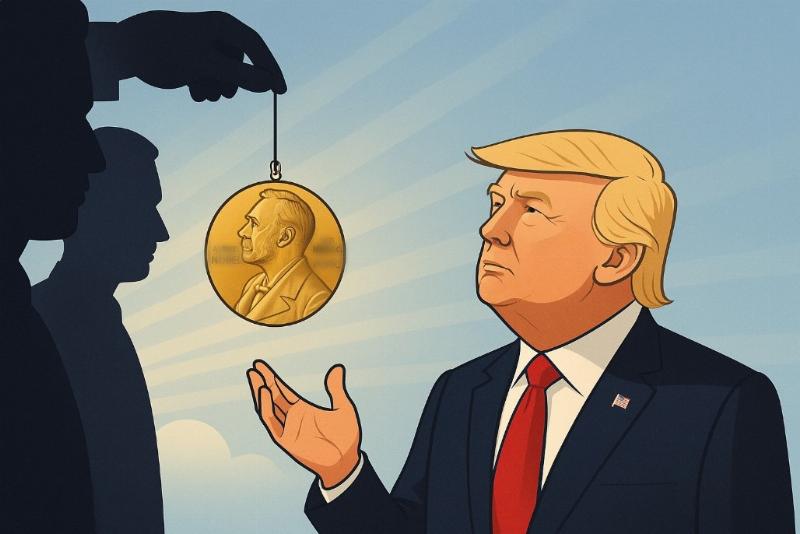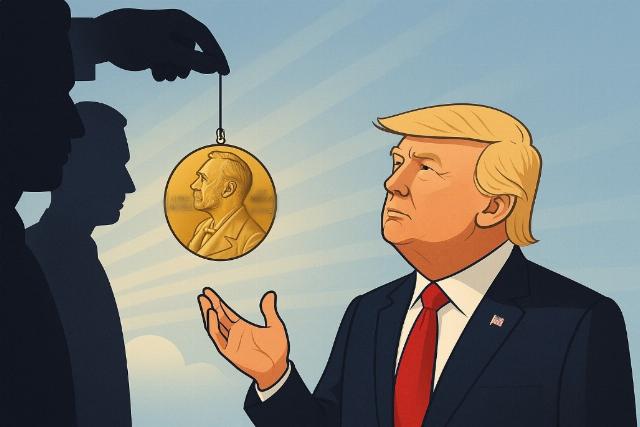


The Nobel Peace Prize is dead—and it died of cowardice.
They gave Barack Obama a Nobel Peace Prize for hope.
Donald Trump earned a ten for results—and got no prize.
That single fact reveals more about the moral and institutional decay of Western leadership than any lecture about democracy ever could.
It wasn’t just a snub. It was a confession—a quiet admission that the Nobel Peace Prize, once a lodestar of moral clarity, has become a mirror of elite insecurities, incapable of recognizing peace when it comes from someone they didn’t script, sanctify, or control.

Image created using AI.
For more than a century, the Nobel Peace Prize was treated as the world’s moral compass—a recognition reserved for people who reduced suffering or risked everything to stop wars. It symbolized integrity across borders: the award that crowned the end of conflict, not the beginning of conversation.
Then came 2009—and with it, the collapse of credibility.
Barack Obama was awarded the Nobel Peace Prize before he had even signed a single treaty, halted a single war, or moved into the White House. He had no record. No results. Only rhetoric.
Even Obama himself, to his credit, called the prize a “call to action,” not a reward for achievement. But it didn’t matter. The precedent was set: image over impact. From that moment, the Peace Prize began its descent into symbolism—a ceremonial gold star for those who said the right things, whether they ever did them.
Fifteen years later, history offered the Nobel Committee a chance to correct that mistake. It didn’t.
Donald Trump ended the Gaza war—after two years of relentless bloodshed and decades of frozen conflict, his envoys brokered a ceasefire between Israel and Hamas that included:
But Gaza was only one front. During his first term and the nine months of his second term, Trump also achieved the following:
No American president since Eisenhower has done more to de-escalate global conflict zones than Donald Trump.
However, the Nobel Committee members could not acknowledge this because admitting Trump’s success means admitting their worldview is wrong.
For decades, Western elites have insisted that peace is a process consisting of endless negotiations, committees, and photo ops. Peace was paperwork.
Trump proved the opposite: peace can come from will, clarity, and leverage.
He didn’t play by the script. He wielded American power bluntly, effectively, and unapologetically, producing results that multilateral diplomacy failed to deliver for decades.
That is what the Nobel Committee cannot forgive. Not the man, but the model.
Obama was rewarded for speeches; Trump was punished for solutions.
Under Obama, the Middle East fractured. Under Trump, it steadied: ISIS was crushed, Iran was deterred, Arabs and Israelis shook hands, rocket fire ceased, peace frameworks were signed from the Caucasus to Cambodia.
These are measurable outcomes—and yet, silence from Oslo. Because for the Nobel Committee, eloquence is virtue and achievement is a threat.
By refusing to honor Trump, the Nobel Committee discredited itself.
It told the world that merit depends on ideology, not impact—that truth no longer matters.
This is how institutions lose legitimacy. When people see peace achieved but ignored, when merit is dismissed because of who achieved it, they stop believing in fairness—and begin rejecting the entire system.
In 2025, the Nobel Committee awarded Venezuelan opposition leader María Corina Machado, a courageous and honorable woman who herself publicly dedicated the nomination to Donald Trump and the Venezuelan people, crediting Trump’s sustained pressure campaign against Nicolás Maduro’s narco-terrorist regime for keeping hope alive in Caracas.
When the Norwegian Committee announced its latest laureate, the world responded not with reverence but with disbelief.
That admission should have exposed the absurdity of the Committee’s choice. By their own laureate’s words, the credit for Venezuela’s democratic opening belongs to Trump—the very man they refused to honor.
But that may have been the point. The decision to crown Machado was not just a misjudgment; it was a calculated message. By selecting her, the Committee could feign moral consistency while subtly provoking Trump—implying his policies had been co-opted by their ideological camp, baiting him to disown the very opposition his pressure helped sustain.
In reality, this move strengthens Maduro, not the Venezuelan people. It reframes Trump’s victory over a dictatorship as a Western NGO cause, stripping it of American resolve and moral clarity. Quietly, the Committee sought to turn the author of Venezuela’s liberation into its villain—to make strength seem like sin.
This was no accidental oversight. By awarding Machado, the Nobel Committee sanitized Trump’s results, recasting them as a soft, ideological cause while undermining the American leadership that made Venezuela’s democratic opening possible. It was a deliberate act to protect political purity at the expense of true peace.
In choosing political theater over genuine impact, the Nobel Committee exposed itself not as an arbiter of peace, but as a guardian of convenient narratives—willing to sacrifice truth for power.
If the Nobel Peace Prize still had integrity, this would have been its redemption year.
Instead, it chose silence—preserving political purity over historic outcomes, protecting its club rather than honoring its charter.
History will remember differently: Donald Trump didn’t lose the Nobel Peace Prize—the Nobel Peace Prize lost Donald Trump.
Peace, in the end, is not about who you are. It’s about what you do.
